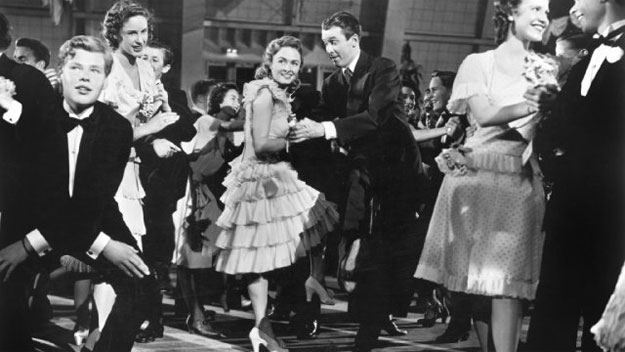It’s a Wonderful Life (1946) 
“They’re going steady…straight to your heart!”

Director: Frank Capra
Cast: James Stewart, Donna Reed, Lionel Barrymore
Synopsis: An angel helps a compassionate but despairingly frustrated businessman by showing what life would have been like if he never existed.
It seems inconceivable at first glance that It’s a Wonderful Life, arguably the planet’s favourite Christmas movie, failed so badly at the box office upon its first release. After all, it has an amiable leading man at the height of his popularity, the trademark Capra touches that worked so well before and after, and a heartwarming and life-affirming tale which, however unlikely it might be, still, after numerous viewings, brings a lump to the throat. But then, back in 1946 the world was just emerging from a world war on a scale which had never before been seen and which will probably never be again. The people who’d fought in that war, or who had lost loved ones to it, were still licking their wounds and were probably in no mood for a movie that first tips its frustrated hero into the bleakest depths of despair before then delivering a sentimental finale which probably came across as a little fake in 1946.
The movie’s hero, George Bailey (James Stewart), is a man who once had big plans to travel the world and make his mark. But events intervene – often moments before he’s due to ship out of his small home town of Bedford Falls – to frustrate him at each attempt: his father (Samuel S. Hinds) suffers a fatal stroke, leaving George to run the family Buildings and Loan company; his younger brother Harry (Todd Karns), whose life George once saved, and who was supposed to take over the reins upon completing his education, returns with a new wife (Virginia Patton) and the news that he’s accepted a lucrative job offer from his new father-in-law; the money George set aside for his honeymoon with his own new wife Mary (Donna Reed) is swallowed up appeasing panicky investors in the wake of the Wall Street Crash. Then, when it looks as if his loans company is going to fall in the hands of the unscrupulous miser Henry F. Potter (Lionel Barrymore), George seriously considers suicide, and is on the verge of throwing himself over a bridge into a turbulent river that reflects his state of mind when a strange little man beats him to it…
It’s a Wonderful Life is a celebration of the common man, the modest mass of men who, in the words of Thoreau, lead lives of quiet desperation, dreaming of a better life as they toil in their routine jobs, and knowing deep down that their dreams will probably never be realised. It’s perhaps for this reason that It’s a Wonderful Life continues to enjoy enduring popularity: it taps into an instantly recognisable facet of everyday life, while suggesting we‘re perhaps not as insignificant as we tend to think we are, that our lives touch the lives of others in ways we simply can‘t imagine. It’s perhaps telling, though, that the only way in which Capra can counter Thoreau’s assertion is by couching it in the midst of a fantasy, an unreal artifice that suggests that, if Thoreau’s theory is untrue, most men in the real world will probably never come to realise it.
But then aren’t life-affirming movies like It’s a Wonderful Life, a temporary release from that desperation? It’s almost self-reflexive in the way it causes us to stop and consider how we have affected the lives of those around us. There were few better than Jimmy Stewart at capturing the better qualities of the ordinary man, and it’s interesting to see him exploring darker emotions years before they became a speciality in his middle years. George Bailey isn’t a spotless white hero; he’s damaged by his frustrations and liable to take his frustrations out on his family – and that‘s perhaps another reason why audiences in the 1940s turned their backs on the movie: they were used to seeing Stewart as a crusading or light-hearted hero, not a sad and angry man fighting the same frustrations that tormented its audience.
It’s ironic that it’s perhaps the realism of George Bailey’s predicament that spelled box office disaster for a movie that is primarily a fantasy. Today, viewed through a fog of nostalgia for a time which we consider to be simpler, we tend to ignore it’s hard edges, focusing instead on the warm and fuzzy parts, which is perhaps to do the film a disservice. It’s a Wonderful Life delivers not only a warmly humorous feel-good fantasy, it also provides a much darker – and equally timeless – study of the human condition.
(Reviewed 13th August 2012)
httpv://www.youtube.com/watch?v=KZ_OZpb0wIA
